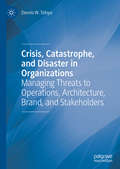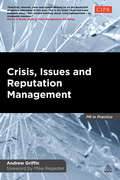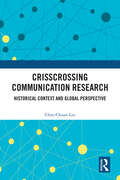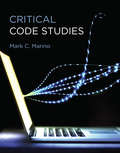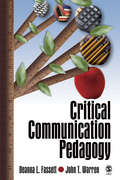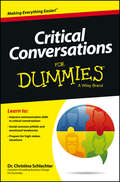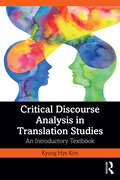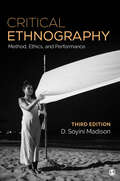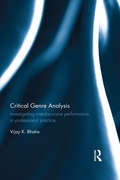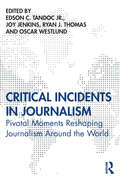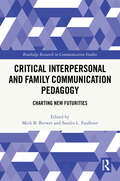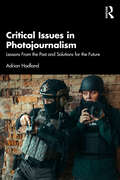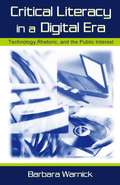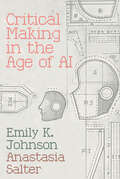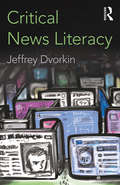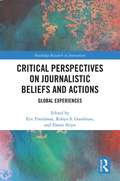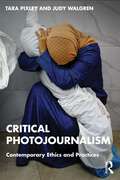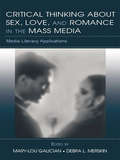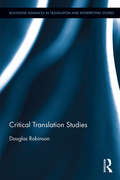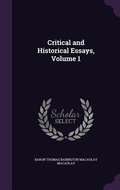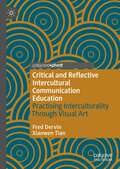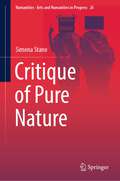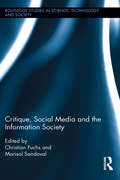- Table View
- List View
Crisis, Catastrophe, and Disaster in Organizations: Managing Threats to Operations, Architecture, Brand, and Stakeholders
by Dennis W. TafoyaThis book explores how and why an event is a precursor to the emergence of a crisis and how a given crisis affects an organization and its stakeholders. Using existing systems theory blended with innovative use of wave, epidemiological, immunological and psycho-social theories, the author discusses ways to understand the effects of different types of crises while showing how to document and/or quantitatively measure those effects. The book offers new models illustrating how events trigger crises and how they subsequently morph into catastrophes and disasters. Using theories and tools tested in organizational settings to identify contributors to a traumatic event, this book makes a valuable contribution to organizational and crisis management literature.
Crisis, Issues and Reputation Management
by Andrew GriffinThe reputation of an organisation influences who we buy from, work for, supply to and invest in. In today's complex environment, organizations have to understand and respond rapidly to shifting public values, rising expectations, demands for public consultation and increasingly intrusive news media. This is particularly important when things go wrong. Crisis, Issues and Reputation Management outlines a comprehensive approach to managing situations that may turn into crises; handling crises once they occur; and features a wide range of case studies of brands who have had to respond to a variety of crises including Nestle, Unilever, General Electric, McDonald's, Coca-cola, Cadbury, Tesco, Pan Am, RBS and more. Crisis, Issues and Reputation Management defines reputation, explores how to value it and provides practical guidelines for effective reputation management, including advising companies on how to approach issues of Corporate Social Responsibility.
Crisscrossing Communication Research: Historical Context and Global Perspective
by Chin-Chuan LeeDrawing on studies of international communication and late Qing and Republican newspapers, this book examines the intellectual and practical development of communication from a global and historical perspective.The book is organized in two parts. The first part explores the “domestication” and fragmentation of communication studies, examining how domestic communication paradigms have been transformed into “refined mediocrity” and how international communication is now included in discussions of “modern theory”. Focusing on the newspapers of China’s Republican era, the second part explores the history of journalism from a variety of perspectives and addresses several key research issues. By exploring ways to connect theories in the humanities and social sciences, bridging the gap between Eastern and Western cultures, and interweaving case studies and macro-level theorizing, the author shows that communication analysis is necessarily dialectical, specific, complementary, and conditional. The book sheds important light on how acting locally while thinking globally can help us reconstruct the epistemological and methodological foundations of international communication.The title will appeal to scholars and students in communication studies, journalism, and the social sciences, especially those interested in international communication.
Critical Code Studies: Initial Methods (Software Studies)
by Mark C. MarinoAn argument that we must read code for more than what it does—we must consider what it means.Computer source code has become part of popular discourse. Code is read not only by programmers but by lawyers, artists, pundits, reporters, political activists, and literary scholars; it is used in political debate, works of art, popular entertainment, and historical accounts. In this book, Mark Marino argues that code means more than merely what it does; we must also consider what it means. We need to learn to read code critically. Marino presents a series of case studies—ranging from the Climategate scandal to a hactivist art project on the US-Mexico border—as lessons in critical code reading.Marino shows how, in the process of its circulation, the meaning of code changes beyond its functional role to include connotations and implications, opening it up to interpretation and inference—and misinterpretation and reappropriation. The Climategate controversy, for example, stemmed from a misreading of a bit of placeholder code as a “smoking gun” that supposedly proved fabrication of climate data. A poetry generator created by Nick Montfort was remixed and reimagined by other poets, and subject to literary interpretation.Each case study begins by presenting a small and self-contained passage of code—by coders as disparate as programming pioneer Grace Hopper and philosopher Friedrich Kittler—and an accessible explanation of its context and functioning. Marino then explores its extra-functional significance, demonstrating a variety of interpretive approaches.
Critical Communication Pedagogy
by Dr Deanna L. Fassett Dr John T. WarrenIn this autoethnographic work, authors Deanna L. Fassett and John T. Warren illustrate a synthesis of critical pedagogy and instructional communication, as both a field of study and a teaching philosophy. Critical Communication Pedagogy is a poetic work that charts paradigmatic tensions in instructional communication research, articulates commitments underpinning critical communication pedagogy, and invites readers into self-reflection on their experiences as researchers, students, and teachers.
Critical Conversations For Dummies
by Christina Tangora SchlachterThe easy way to communicate best when it matters mostMost people are aware of the importance of handling critical conversations well. However, when it comes down to actually being in a difficult situation that calls for key communication skills, many do not know how to practically apply their own thoughts.Critical Conversations For Dummies is a step-by-step reference for the variety of crucial conversations life presents in the workforce. It's packed with strategies for preparing for high-stakes situations; being persuasive (not abrasive); knowing the value of assertive communication; resolving failed promises and missed deadlines; maintaining morale when firing staff; getting new employees off on the right foot; managing staff relations and strengthening team relationships; understanding audience needs and motivations to get positive results; altering confrontational language to cooperative language during difficult conversations; and building relationships in the face of conflict.Improve communication skills in crucial conversationsAvoid common pitfalls and emotional tendenciesDiscover the benefits of success in crucial conversations This book is especially relevant to the hundreds of thousands of leaders who are tasked with multiple duties, whether addressing complex problems from stakeholders or achieving exceptional results from staff.
Critical Discourse Analysis in Translation Studies: An Introductory Textbook
by Kyung Hye KimCritical Discourse Analysis in Translation Studies is the first textbook to provide a systematic treatment of how CDA may be applied to the analysis of translated and interpreted texts.Kyung Hye Kim provides in-depth explanations about how various strands of CDA, from the M.A.K. Hallidayan analytical framework to Norman Fairclough’s dialectical relationship model and Teu van Dijk’s ideological square, can be employed in translation studies to deliver rich analyses of translated text. She demonstrates the ability of CDA to address complex translation practices, in both traditional and digital media, using various examples in different languages. With numerous exercises using authentic texts, this textbook empowers readers to apply a CDA framework in their own work.This accessible textbook is essential reading for all students of discourse and text analysis within translation and interpreting studies.
Critical Ethnography: Method, Ethics, and Performance
by D. Soyini Madison"Critical Ethnography is a rare and beautiful synthesis of deft theorizing and principled pragmatics. The complexities of ethnography demand a grasp of both theory and practice, but rarely have they come together so clearly and completely as in this passionately written text. I especially appreciate the thoughtful attention to the intellectual roots of the critical tradition in ethnography, and to the way students are rigorously led through the methodological consequences of critical epistemology." —Judith Hamera, Texas A&M University "I would strongly recommend this book for use in any course that explores the role of critical analysis in research. This book thoughtfully discusses and teaches about trying to understand the meanings attributed by others in regard to their expertise." —Amy Paul-Ward, Florida International University What is critical ethnography? How do we use theory to interpret research data? What is performance ethnography? Readers can find answers to these fundamental questions in D. Soyini Madison′s engaging and highly multidisciplinary Third Edition of Critical Ethnography: Methods, Ethics, and Performance. The book presents a fresh new look at critical ethnography by emphasizing the significance of ethics and performance in the art and politics of fieldwork. The productive links between theory and method are celebrated in this title. Theoretical concepts range from queer theory, feminist theory, and critical race theory to Marxism and phenomenology. The methodological techniques range from designing and asking in-depth interview questions and developing rapport to coding and interpreting data. The various theories and methods culminate in three fictional ethnographic case studies that "enact" the interdependence between theory and method and the significance of social theory, ethics, and performance.
Critical Ethnography: Method, Ethics, and Performance
by D. Soyini Madison"Critical Ethnography is a rare and beautiful synthesis of deft theorizing and principled pragmatics. The complexities of ethnography demand a grasp of both theory and practice, but rarely have they come together so clearly and completely as in this passionately written text. I especially appreciate the thoughtful attention to the intellectual roots of the critical tradition in ethnography, and to the way students are rigorously led through the methodological consequences of critical epistemology." —Judith Hamera, Texas A&M University "I would strongly recommend this book for use in any course that explores the role of critical analysis in research. This book thoughtfully discusses and teaches about trying to understand the meanings attributed by others in regard to their expertise." —Amy Paul-Ward, Florida International University What is critical ethnography? How do we use theory to interpret research data? What is performance ethnography? Readers can find answers to these fundamental questions in D. Soyini Madison′s engaging and highly multidisciplinary Third Edition of Critical Ethnography: Methods, Ethics, and Performance. The book presents a fresh new look at critical ethnography by emphasizing the significance of ethics and performance in the art and politics of fieldwork. The productive links between theory and method are celebrated in this title. Theoretical concepts range from queer theory, feminist theory, and critical race theory to Marxism and phenomenology. The methodological techniques range from designing and asking in-depth interview questions and developing rapport to coding and interpreting data. The various theories and methods culminate in three fictional ethnographic case studies that "enact" the interdependence between theory and method and the significance of social theory, ethics, and performance.
Critical Genre Analysis: Investigating interdiscursive performance in professional practice
by Vijay K. BhatiaGenre theory has focused primarily on the analysis of generic constructs, with increasing attention to and emphasis on the contexts in which such genres are produced, interpreted, and used to achieve objectives, often giving the impression as if producing genres is an end in itself, rather than a means to an end. The result of this focus is that there has been very little attention paid to the ultimate outcomes of these genre-based discursive activities, which are more appropriately viewed as academic, institutional, organizational, and professional actions and practices, which are invariably non-discursive, though often achieved through discursive means. It was this objective in mind that the book develops an approach to a more critical and deeper understanding of interdiscursive professional voices and actions. Critical Genre Analysis as a theory of discursive performance is thus an attempt to be as objective as possible, rigorous in analytical endeavour, using a multiperspective and multidimensional methodological framework taking into account interdiscursive aspects of genre construction to make it increasingly explanatory to demystify discursive performance in a range of professional contexts.
Critical Incidents in Journalism: Pivotal Moments Reshaping Journalism around the World
by Oscar Westlund Edson C. Tandoc Jr. Joy Jenkins Ryan J. ThomasThis edited collection examines critical incidents journalists have faced across different media contexts, exploring how journalists and other key actors negotiate various aspects of their work. Ranging from the Rwandan genocide to the News of the World hacking scandal in the UK, this book defines a critical incident as an event that has led journalists to reconsider their routines, roles, and rules. Combining theoretical and practical analysis, the contributors offer a discussion of the key events that journalists cover, such as political turmoil or natural disasters, as well as events that directly involve and affect journalists. Featuring case studies from countries including Australia, Germany, Brazil, Kenya, and the Philippines, the book explores the discourses that critical events have generated, how journalists and other stakeholders have responded to them, and how they have reshaped (or are reshaping) journalistic norms and practices. The book also proposes a roadmap for studying such pivotal moments in journalism. This one-of-a-kind collection is a valuable resource for students and scholars across journalism studies disciplines, from journalism history, to sociology of news, to digital journalism and political communication.
Critical Interpersonal and Family Communication Pedagogy: Charting New Futurities (Routledge Research in Communication Studies)
by Sandra L. Faulkner Mick B. BrewerThis volume establishes critical interpersonal and family communication pedagogy (CIFCP) as a distinct academic area of inquiry, highlighting the intersections of identity, power, culture, pedagogy, and interpersonal and family communication concepts, theories, and methods.This practical, theoretical, and aspirational collection by interpersonal and family communication (IPFC) scholars and teachers shines a spotlight on, through a diversity of methods, some of the ways that power both emanates within the classroom and informs intellectual instruction. Providing examples that connect critical theories and concepts with topics common in IPFC classrooms, such as conflict, relational tension, disclosure, listening, and family dynamics, the book illustrates how critical concepts can be uniquely addressed and unpacked in IPFC classrooms through a variety of assignments, teaching activities, and discussion prompts, and promotes and normalizes the ongoing reflexive practices of IPFC instructors.This book will interest academics and upper-level students working in the areas of Critical Methodology, Interpersonal Communication, Family Communication, and Relationship Science.
Critical Issues in Photojournalism: Lessons From the Past and Solutions for the Future
by Adrian HadlandDrawing on original research and industry experience, this book studies the historical debates and controversies underpinning photojournalism and those practising it today.Beginning with the origins of photography and the close-knit relationship between journalism and the image, this book goes on to consider the theories that have sought to unpick photography and photojournalism and how these translate to contemporary practice. Hadland examines the present and potential roles of photojournalism in society and reflects on how technological advances such as Artificial Intelligence may impact the profession. Ethical considerations and certain immeasurable dimensions of photography, including concepts of power, truth, and meaning, are brought into question alongside ongoing issues of exclusion and homogeneity amongst professional photojournalists.Critical Issues in Photojournalism is an ideal primer for students seeking a solid historical, ethical, and reflective understanding of the discipline.
Critical Literacy in A Digital Era: Technology, Rhetoric, and the Public interest
by Barbara WarnickCritical Literacy in a Digital Era offers an examination of the persuasive approaches used in discussions on and about the Internet. Its aim is to increase awareness of what is assumed, unquestioned, and naturalized in our media experience. Using a critical literacy framework for her analysis, author Barbara Warnick argues that new media technologies become accepted not only through their use, but also through the rhetorical use of discourse on and about them. She analyzes texts that discuss new media and technology, including articles from a major technology-oriented periodical; women's magazines and Web sites; and Internet-based political parody in the 2000 presidential campaign. These case studies bring to light the persuasive strategies used by writers to influence public discourse about technology. The book includes analyses of narrative structures, speech genres, intertextuality, argument forms, writing formulae, and patterns of emphasis and neglect used in traditional and new media outlets. As a result, this distinctive work identifies the features of online speech that bring people and ideas together and enable communities to form in new media environments. As a unique study of the ways in which ideology is embedded in rhetorical texts, this volume will play a significant role in the development of critical literacy about writing and speech concerning new communication technology. It will be of interest to readers concerned about how our talk about communication affects how we think about it, in particular those interested in communication and social change, public persuasion, and rhetorical criticism of new media content.
Critical Making in the Age of AI
by Anastasia Salter Emily JohnsonCritical Making in the Age of AI invites students, teachers, learners, and digital humanists to explore making as scholarship. Inspired by the craft traditions of textile arts, this book combines a survey of forms of alternative scholarly communication—such as comics, GIFs, maps, games, and generative AI—and a pattern book, where patterns serve as starting points that makers can reimagine and remix. Firmly grounded in the humanities and utilizing free tools and platforms (including Twine, Voyant, and Tracery) wherever possible, this engaging and accessible guide to digital methods introduces and puts into practice concepts that are essential to preparing students to navigate a changing landscape of media and information without investing in proprietary software, dedicated lab space, or expensive creative tools. The book’s eight patterns are especially appropriate for those just beginning to explore digital scholarly methods, and one goal of Critical Making in the Age of AI is to provide structure for work that is both meaningful and achievable with limited resources and time. By centering critical making through a design-justice and feminist lens, the coauthors model how inclusive and expansive approaches to making in research and teaching are vital to shaping the humanities of the future.
Critical News Literacy
by Jeffrey Dvorkin<p>In an era of "fake news" and a seemingly insurmountable influx of data on the Internet, it is critical for both journalists and citizens to understand the digital media we consume daily. This introductory textbook gives students the tools they need to think critically about the news, and to see reliable news as an essential aspect of what it means to be an informed citizen in a democracy. <p>After reading this text, students will be able to: <p> <li>Analyze key elements of news reports by weighing evidence, evaluating sources, noting context and transparency to judge reliability. <li>Distinguish among journalism, informed opinion and unsupported opinions. <li>Identify and distinguish between news media bias and audience bias. <li>Use examples from the daily news media to show critical thinking about civic engagement. <li>Develop a skeptical and engaged approach to social media and digital technology.</li>
Critical Perspectives on Journalistic Beliefs and Actions: Global Experiences (Routledge Research in Journalism)
by Eric Freedman Robyn S. Goodman Elanie SteynThis book provides case studies, many incorporating in-depth interviews and surveys of journalists. It examines issues such as journalists’ attitudes toward their contributions to society; the impact of industry and technological changes; culture and minority issues in the newsroom and profession; the impact of censorship and self-censorship; and coping with psychological pressures and physical safety dilemmas. Its chapters also highlight journalists’ challenges in national and multinational contexts. International scholars, conducting research within a wide range of authoritarian, semi-democratic, and democratic systems, contributed to this examination of journalistic practices in the Arab World, Australia, Bangladesh, Bulgaria, China, Denmark, India, Kenya, Kyrgyzstan, Malaysia, Mexico, Russia, Samoa, South Africa, Taiwan, Turkey, and the United States.
Critical Photojournalism: Contemporary Ethics and Practices
by Judy Walgren Tara PixleyAn essential introduction to the complexities of visual representation, this book offers a critical new framework for understanding and practicing photojournalism in a global digital context.Critical Photojournalism guides readers through a variety of ethical, technical and business skills, plus the mental health, self-care and safety considerations necessary to thrive in the field. Drawing on their extensive industry and teaching experience, the authors provide real-world advice on how to navigate the demands of the profession while addressing the impact that photojournalism has on society and ways that photojournalists can mitigate harm. Consideration is given to understanding and disrupting implicit bias and power structures in newsrooms, as well as issues around access, working in breaking news environments and balancing informed consent with varying media laws around the world. In accessible language, this book highlights the importance of collaboration and community engagement in contemporary photojournalism and encourages students to adopt a decolonial approach to their work. Readers will learn to balance the needs for accuracy and thoughtfulness with the priorities of a global, social-media-engaged audience.This is a key textbook for those seeking a nuanced introduction to visual journalism and/or a fresh approach to their craft. This book is supported by a website which can be accessed at www.criticalphotojournalism.com. The website includes a full-length bonus chapter on video and photojournalism, interviews with professional visual journalists, further tips and tools, and a glossary of key terms.
Critical Thinking About Sex, Love, and Romance in the Mass Media: Media Literacy Applications (Routledge Communication Series)
by Mary-Lou Galician Debra L. MerskinThis distinctive volume explores how romantic coupleship is represented in books, magazines, popular music, movies, television, and the Internet within entertainment, advertising, and news/information. This reader offers diverse theoretical perspectives and methodological approaches on the representation of romantic relationships across the media spectrum. Filling a void in existing media scholarship, this collection explores the media's influence on perceptions and expectations in relationships, including the myths, stereotypes, and prescriptions manifested throughout the press. Featuring fresh voices, as well as the perspectives of seasoned veterans, contributions include quantitative and qualitative studies along with cultural/critical, feminist, and descriptive analyses. This anthology has been developed for use in courses on mass media and society, media studies, and media literacy. In addition to its use in coursework, it is highly relevant for scholars, researchers, and others interested in how the media influence the personal lives of individuals.
Critical Thinking, Reading And Writing: A Brief Guide To Argument
by John O'Hara Sylvan Barnet Hugo BedauCritical Thinking, Reading, and Writing is a compact but complete guide to critical thinking and argumentation. Comprising the text portion of the widely adopted Current Issues and Enduring Questions, it draws on the authors’ dual expertise in effective persuasive writing and comprehensive rhetorical strategies to help students move from critical thinking to argumentative and researched writing. With comprehensive coverage of classic and contemporary approaches to argument, including Aristotle, Toulmin, and a range of alternative views, as well as 35 readings and a casebook on the state and the individual, it is an extraordinarily versatile text. This affordable guide can stand alone or supplement a larger anthology of readings.
Critical Translation Studies: Centrifugal Theories, Critical Interventions (Routledge Advances in Translation and Interpreting Studies #Vol. 4)
by Douglas RobinsonThis book offers an introduction for Translation Studies (TS) scholars to Critical Translation Studies (CTS), a cultural-studies approach to the study of translation spearheaded by Sakai Naoki and Lydia H. Liu, with an implicit focus on translation as a social practice shaped by power relations in society. The central claim in CTS is that translators help condition what TS scholars take to be the primal scene of translation: two languages, two language communities, with the translator as mediator. According to Sakai, intralingual translation is primal: we are all foreigners to each other, making every address to another "heterolingual", thus a form of translation; and it is the order that these acts of translation bring to communication that begins to generate the "two separate languages" scenario. CTS is dedicated to the historicization of the social relations that create that scenario. In three sets of "Critical Theses on Translation," the book outlines and explains (and partly critiques) the CTS approach; in five interspersed chapters, the book delves more deeply into CTS, with an eye to making it do work that will be useful to TS scholars.
Critical and Historical Essays -- Volume 1
by Baron Thomas Babington Macaulay MacaulayCritical and Historical Essays: Contributed to the Edinburgh Review (1843) is a collection of articles by Thomas Babington Macaulay, later Lord Macaulay. They have been acclaimed for their readability, but criticized for their inflexible attachment to the attitudes of the Whig school of history.
Critical and Reflective Intercultural Communication Education: Practicing Interculturality Through Visual Art
by Fred Dervin Xiaowen TianThis book provides answers to the following questions: How could visual art support us in reflecting about interculturality critically? When we look at, engage with and experience art, what is it that we can learn, unlearn and relearn about interculturality? The book adds to the multifaceted and multidisciplinary field of intercultural communication education by urging those working on the notion of interculturality (researchers, scholars and students) to give art a place in exploring its complexities. No knowledge background about art (theory) is needed to work through the chapters. The book helps us reflect on ourselves and on our engagement with the world and with others, and learn to ask questions about these elements. The authors draw on anthropology, linguistics, philosophy and sociology to enrich their discussions of critical interculturality.
Critique of Pure Nature (Numanities - Arts and Humanities in Progress #26)
by Simona StanoThis book challenges the Western contemporary “praise for Nature”. From food to body practices, from ecological discourses to the Covid-19 pandemic, contemporary imaginaries abound with representations of an ideal “pure Nature”, essentially defined according to a logic of denial of any artificial, modified, manipulated — in short, cultural — aspect.How should we contextualise and understand such an opposition, especially in light of the rich semantic scope of the term “nature” and its variability over time? And how can we — if we actually can — envisage alternative models and approaches capable of better accounting for such richness and variability? The author addresses these fundamental issues, combining an initial theoretical problematisation of the concept of nature and its evolution — from classical philosophy to the crucial changes occurred through the Middle Ages, the Renaissance, Romanticism and the modern era, finally considering recent insights in philosophy, sociology, cultural anthropology and semiotics — with the analysis of its discursivisation — from the iconography of Mother Nature between the past and the present to the representation of catastrophic events in fictional and non-fictional texts, from clean eating and other popular food trends to the ambivalence of the naked body between its supposed natural ascription and its multiple cultural characterisations. Thus she introduces a critique of pure Nature, providing a systematic study of the way nature is attributed meaning and value in some of today’s most relevant discourses and practices, and finally tracing a possible path towards an “internatural turn”.
Critique, Social Media and the Information Society (Routledge Studies in Science, Technology and Society)
by Christian Fuchs Marisol SandovalIn times of global capitalist crisis we are witnessing a return of critique in the form of a surging interest in critical theories (such as the critical political economy of Karl Marx) and social rebellions as a reaction to the commodification and instrumentalization of everything. On one hand, there are overdrawn claims that social media (Twitter, Facebook, YouTube, etc) have caused uproars in countries like Tunisia and Egypt. On the other hand, the question arises as to what actual role social media play in contemporary capitalism, crisis, rebellions, the strengthening of the commons, and the potential creation of participatory democracy. The commodification of everything has resulted also in a commodification of the communication commons, including Internet communication that is today largely commercial in character. This book deals with the questions of what kind of society and what kind of Internet are desirable, how capitalism, power structures and social media are connected, how political struggles are connected to social media, what current developments of the Internet and society tell us about potential futures, how an alternative Internet can look like, and how a participatory, commons-based Internet and a co-operative, participatory, sustainable information society can be achieved.
